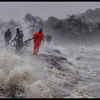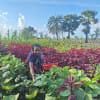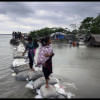COP29 must set a new goal for climate finance and adaptation

As the climate crisis transcends borders, the 29th edition of the annual UN Climate Change Conference, COP29, taking place in Baku, Azerbaijan this year, is gearing to welcome 127 countries to spearhead the next stage in global climate negotiations. With rising global temperatures and escalating weather events, the conference will prioritise securing climate finance, which is defined as mobilisation of public and private money into three focus groups—adaptation, mitigation, and loss and damage—as needed by vulnerable countries to cut greenhouse gas (GHG) emissions and protect susceptible communities. A central focus will be on the submission of updated national climate action plans under the Paris Agreement, which the countries must present by early 2025.
These policies aim to limit global warming to 1.5 degrees Celsius above pre-industrial levels and contribute to achieving the Sustainable Development Goals (SDGs). COP29 will bring together leaders from governments, businesses, and civil society to collaborate on actionable solutions, with the potential to unlock significant investments and shape the future of global climate policy. Briefly, the agendas of COP29 are focused on adaptation and finance. Adaptation refers to adjustments in ecological, social or economic systems in response to actual or expected climatic stimuli and their effects, with steps and efforts aimed at building resilience against climate changes.
It is crucial to understand that there can be no adaptation of a "3 Degree World." With the current policies, Planet Earth is on track for a three degrees Celsius temperature rise above pre-industrial levels—an unprecedented increase. At this level, ecosystems and infrastructures will struggle to cope. The Equator-centric regions are expected to experience much greater warming, potentially twice the global average. This will lead to extreme heat-trapping, which will significantly increase mortality rates, making large parts of the tropics uninhabitable. As the risk of crossing irreversible climate tipping points grows, the consequences for both the environment and human populations might be devastating. However, a three-degree world is not inevitable; with decisive and swift action it can be prevented, and this is the fundamental goal behind COP29.
At COP28, substantial progress was made on climate finance—particularly with the establishment of the Loss and Damage Fund. The aspiration was that affluent nations would conclusively fulfil their long-standing commitment to provide $100 billion annually in climate finance, but the reality was far from reflective of said assertions. Bangladesh is looking to this summit with a sense of urgency, reflecting the country's deteriorating climate crisis. Despite some advances in addressing loss and damage, the $100 billion target is still unmet. This is deeply concerning given the geo-environmental condition of Bangladesh, which is already suffering from rising sea levels and frequent floods.
In 2024, Bangladesh continues to struggle with intensifying impacts of climate change caused primarily by the activities of developed nations. As a low-lying delta nation, it is experiencing increased monsoon flooding and cyclonic activity. For Bangladesh, these recurring floods lead to not only climate-induced displacement but also long-term economic losses, as people lose livelihoods, homes, and access to clean water. Cyclone Mocha, one of the strongest storms to hit the region in recent years, caused widespread destruction in the coastal areas and surges that inundated coastal settlements, leaving behind a trail of destruction. According to estimates, Bangladesh projects an estimate of two crore climate refugees by 2050, with the majority from the coastal regions. As coastal areas become increasingly uninhabitable, families are forced to move inland, often into urban areas that are already struggling with overpopulation and limited public resources. Looking ahead to COP29, Bangladesh's primary concern is whether the newly proposed New Collective Quantified Goal (NCQG) will deliver the necessary financial resources to tackle its climate adaptation needs. The NCQG aims to supersede the $100 billion pledge, but there is growing concern that the money will not arrive quickly or in sufficient capacities. For Bangladesh, the climate crisis is no longer a distant threat—it's a current reality.
While COP28 offered modest optimism with discussions about reforming global financial systems to attract private investment, Bangladesh remains wary of solutions that rely too heavily on private sector funding, which can be unpredictable and slow to mobilise. The country needs guaranteed and immediate funding for climate adaptation and loss recovery, rather than complex financial mechanisms that may only serve to delay the much-needed assistance.
A key issue that remains unresolved from COP28 to COP29 is whether emerging economies like China and oil-rich Gulf states should contribute to global climate financing. Bangladesh, alongside other vulnerable nations, strongly assert that the burden of financing should not fall solely on the shoulders of the affluent nations. With the growing climate impacts that affect every part of the globe, it is crucial that all major economies—regardless of their development status—participate in climate finance. At COP29, Bangladesh will push for this broader responsibility, arguing that no country is exempt from the global climate emergency. This also includes a dialogue on "just transition," which promotes a fair shift to low-carbon economies by prioritising workers' rights, social equity and community well-being, while minimising negative impacts.
As COP29 progresses, Bangladesh will be watching closely to see whether the international community can meet the urgency of its climate needs. The country's future depends on substantial financial commitments for climate adaptation as well as the ability to recover from climate-induced damage. For Bangladesh, COP29 is not just a diplomatic event—it's a moment of survival. The anticipation is that this time, the world will act with the speed and scale required to avert even greater climate devastation. COP29 will be a critical opportunity for the global communities to ramp up efforts to curb climate change, particularly through enhanced financial support and more ambitious national climate action plans.
Barrister Noshin Nawal is a member of the editorial team at The Daily Star and an environmental activist.
Views expressed in this article are the author's own.
Follow The Daily Star Opinion on Facebook for the latest opinions, commentaries and analyses by experts and professionals. To contribute your article or letter to The Daily Star Opinion, see our guidelines for submission.

 For all latest news, follow The Daily Star's Google News channel.
For all latest news, follow The Daily Star's Google News channel. 










Comments